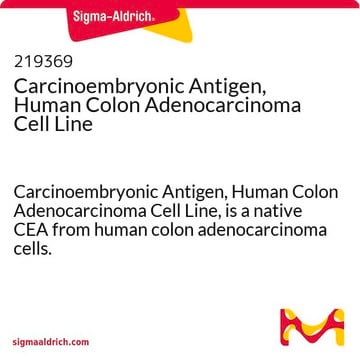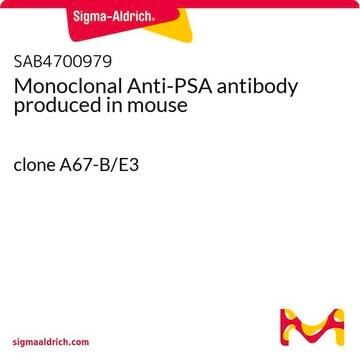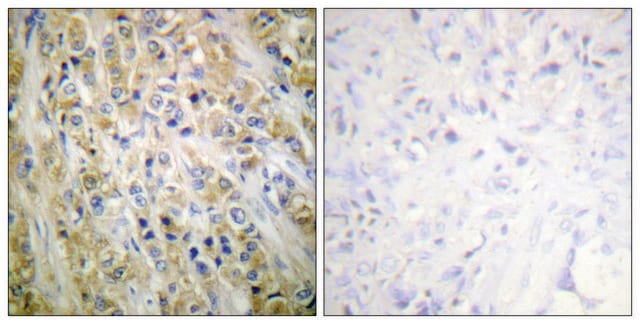C4835
Carcinoembryonic Antigen human
≥95% (SDS-PAGE), buffered aqueous solution
Sinônimo(s):
Cancer-associated CEA
Faça loginpara ver os preços organizacionais e de contrato
About This Item
Produtos recomendados
Nível de qualidade
Ensaio
≥95% (SDS-PAGE)
forma
buffered aqueous solution
nº de adesão UniProt
Condições de expedição
dry ice
temperatura de armazenamento
−20°C
Informações sobre genes
human ... CEACAM5(1048)
Descrição geral
Carcinoembryonic antigen(CEA) or CEA cell adhesion molecule 5 (CEACAM5), is encoded by the gene mapped to human chromosome 19q13.2. CEACAM5 is a member of the CEACAM family. This glycosylated protein contains a typical N-terminal variable immunoglobulin (Ig)-like domain, constant Ig-like domain, and a hydrophobic transmembrane domain with a glycosylphosphatidylinositol lipid moiety.
Aplicação
Carcinoembryonic Antigen human has been used as a standard in electrochemical immunosensor and developed surface plasmon resonance imaging (SPRi) immunosensor. It has also been used as a tumor-associated antigen (TAA) in enzyme-linked immunosorbent assay
Ações bioquímicas/fisiológicas
Carcinoembryonic antigen cell adhesion molecule 5 (CEACAM5) aids in cell adhesion and migration. In addition, this protein inhibits anoikis and thereby promoting tumorigenesis and metastasis. CEACAM5 is used as a biomarker to detect new cancer and cancer recurrence, particularly those with colorectal cancer. Upregulated expression of the gene enhances non-small-cell lung cancer (NSCLC) cell proliferation and invasion by regulating p38–Smad2/3 signaling. Therefore, CEACAM5 might be considered as an effective therapeutic target for treating NSCLC. Overexpression of the gene has also been observed in various types of cancer including gastrointestinal, pancreatic, and breast cancers.
Embalagem
Package size based on protein content
Qualidade
Highly purified
forma física
Solution in 0.15 M phosphate buffered saline, pH 7.4, containing 0.1% sodium azide.
Código de classe de armazenamento
10 - Combustible liquids
Classe de risco de água (WGK)
WGK 1
Ponto de fulgor (°F)
Not applicable
Ponto de fulgor (°C)
Not applicable
Certificados de análise (COA)
Busque Certificados de análise (COA) digitando o Número do Lote do produto. Os números de lote e remessa podem ser encontrados no rótulo de um produto após a palavra “Lot” ou “Batch”.
Já possui este produto?
Encontre a documentação dos produtos que você adquiriu recentemente na biblioteca de documentos.
Os clientes também visualizaram
Xinwen Zhang et al.
The Journal of international medical research, 48(9), 300060520959478-300060520959478 (2020-10-01)
To detect the expression of CEA-related cell adhesion molecule 5 (CEACAM5) in non-small-cell lung cancer (NSCLC) and explore its function in the progression and development of NSCLC. qRT-PCR and immunohistochemistry were performed to detect CEACAM5 expression in human NSCLC tissues
Elrasheid A H Kheirelseid et al.
Journal of gastrointestinal oncology, 4(2), 144-157 (2013-06-05)
Despite developments in diagnosis and treatment, 20% of colorectal cancer (CRC) patients present with metastatic disease and 30% of cases recur after curative surgery. Furthermore, the molecular factors involved in prognosis and response to therapy in CRC is poorly understood.
Beata Szymanska et al.
Analytical biochemistry, 609, 113964-113964 (2020-09-27)
Carcinoembryonic antigen (CEA) is one of the biomarkers most commonly used to determine tumor activity. In this work, a Surface Plasmon Resonance imaging (SPRi) immunosensor was developed. The immunosensor consists of a cysteamine linker attached to a gold chip and
Go, V.L.W.
Cancer, 38, 562-562 (1976)
Yingji Jin et al.
Oncotarget, 8(62), 105425-105439 (2017-12-30)
Serum autoantibodies against tumor-associated antigens (TAAs) have received much attention as potential biomarkers for early detection of cancers, since they can be detected in the early stages of cancers. Autoantibodies against Cancer Antigen 15-3 (CA15-3), carcinoembryonic antigen (CEA), Cancer Antigen
Nossa equipe de cientistas tem experiência em todas as áreas de pesquisa, incluindo Life Sciences, ciência de materiais, síntese química, cromatografia, química analítica e muitas outras.
Entre em contato com a assistência técnica









